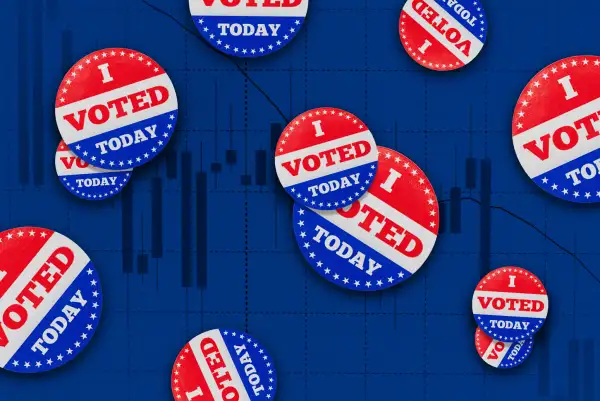Stocks Usually Rise After Midterm Elections. Will That Happen This Time?
Money is not a client of any investment adviser featured on this page. The information provided on this page is for educational purposes only and is not intended as investment advice. Money does not offer advisory services.

Across the country, Democrats and Republicans are gearing up to face off in the midterms — but will the real winner be your investment portfolio?
History says yes.
Stocks tend to surge in November and December during midterm election years, according to a recent analysis from Bespoke Investment Group. The year after usually has good results, too: Since 1928, the third year of the presidential cycle (which would be next year) has overall been the best year of the four-year cycle for the S&P 500, which is the benchmark commonly used to measure the performance of U.S. stocks overall.
Year three of the presidential cycle has seen the S&P 500 gain 82.6% of the time, Bespoke analysts wrote in a note to clients this week.
However, historical trends don't give us the full picture — and they certainly don't guarantee how stocks still perform moving forward.
"There are so many other factors going on in this market right now that I think take precedent over the midterm elections," says David Wagner, portfolio manager at Aptus Capital Advisors.
Here's why this year could be different.
Stock market and midterm elections: What to expect
So far in 2022, the S&P 500 has performed much worse than the typical midterm election year, the Bespoke analysts point out. If you've checked the balance in your 401(k) or other investment accounts recently, you've likely felt the pain. The S&P 500 is down around 22% for the year as of Thursday's market close.
Much of those losses have been attributed to inflation, which is near its highest level in four decades, and the Federal Reserve's response to the high prices. To bring down inflation, the Fed has been raising its benchmark interest rate, most recently by 75 basis points this week — its fourth consecutive rate of that size. While increasing interest rates is a tool used to bring down prices, it can also weigh on the the price of financial assets like stocks, bonds and crypto.
On Wednesday, the central bank signaled that while it would consider smaller interest rate hikes during its upcoming meetings, it's still maintaining a tough policy stance on inflation. In other words, investors shouldn't expect a major policy shift any time soon.
All eyes are on the Fed. Wagner says the trend for the stock market being positive in the 12 months following midterm elections could be bucked if the Fed doesn't pivot its tightening policy.
David Sekera, chief U.S. market strategist for Morningstar, agrees that looking at historical trends definitely doesn't give the full picture.
"I suspect that this historical precedent is of little practical value today," Sekera wrote via a Morningstar market update last week.
First of all, he says historical analyses can be skewed based on the time periods chosen to measure before and after the elections (as in, if you're looking at three months, six months or 12 months) and how far back you look. But also because "the markets are influenced more by expected financial conditions and economic catalysts than by midterm elections."
Coming into 2022, the stock market had to contend with a slowing rate of economic growth, tightening monetary policy, high inflation and rising interest rates.
"For the foreseeable future, we expect that these four headwinds will continue to exert greater impact on the markets than the midterms," Sekera wrote.
And don't expect the stock market volatility investors have been experiencing to disappear anytime soon. Sekera added that Morningstar believes "that volatility will remain elevated until these headwinds begin to abate."
More from Money:
How the Midterm Elections Could Affect Inflation, Taxes and the Economy

